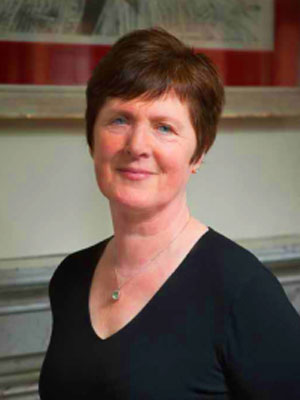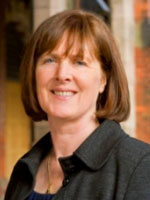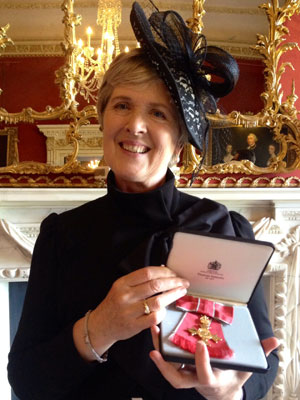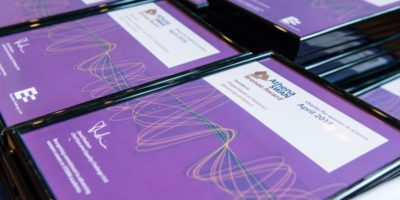Professor Yvonne Galligan OBE is Director of Queen’s University Belfast’s Gender Initiative. Yvonne is also Director of the Centre for Advancement of Women in Politics. She teaches primarily in the area of gender politics, with a particular focus on gender politics in the EU, the UK and Ireland. She convenes and teaches the third year module Women and Politics and an MA module on Gender, Politics and Democracy.

“…The most successful universities in tackling gender imbalance have been those where senior men have had the self-confidence and commitment to work with women to effect gender equality in their organisations. At the end of the day, it’s about making a workplace a fair place to work, for women and for men…”
Yvonne, we’ve mainly been speaking to scientists in this edition so your background is different! Please can you tell us a bit about your career to date and what first got you interested in gender and women in politics?
I’ve been interested in women’s equality issues for a long time, even before I studied it as an academic subject. Perhaps my interest stems from frustrated ambition. As a young girl and teenager I was told that engineering was for boys because they were better at maths than girls.
It didn’t help that my all-girls secondary school taught lower-level maths, and my efforts to persuade the school to teach us higher-level mathematics came to naught! So, from an early age I was coming up against gender stereotypes that really limited my opportunities, and those of other girls too.
Then I became a teacher, a political activist, and a mother. During my time as an active member of the Irish Labour Party, I saw how deeply rooted gender bias was in party and political cultures. This insight prompted me to return to university to study the subject for my Ph.D., and since then I’ve been advocating for and researching on gender equality in academic and public life.
Please can you tell us about the work you’re doing to lead the Gender Initiative at Queen’s and how this fits with the university’s Athena SWAN charter status?

QGI offers a space for women to obtain leadership experience and institutional visibility that they would not otherwise acquire. As the Director of QGI, I see gender equality as a process, not an end. So the agenda continues to evolve, develop and shape the culture. This means that our agenda remains challenging, fresh, and interactive between theory and practice.
Being a social scientist with an expertise in gender and decision-making, I can bring the knowledge gained from research, and from my lived experience, to the agenda for change advanced by QGI. So, I lead QGI in being an internal ‘critical friend’, and I collaborate with women and men across the university, at all levels and positions, to make Queen’s a fair place to work for everyone.
For our readers who aren’t from academia, why is gender balance becoming so important for universities in the UK, Ireland and now beyond?
For too long universities, and the higher education sector more generally, have had a seriously bad record when it comes to women’s promotion and inclusion in decision-making. The sector has operated under a distorted and outdated view of what constitutes ‘merit’.
This has resulted today in very few women holding top leadership positions in universities – only 3 of the 24 Russell Group Vice-Chancellors are women, and in Ireland there are no woman leading universities. In addition, only about one-fifth of professors are women, which does not reflect the representation of women academics in the sector overall.
Concern about the absence of women from senior leadership has been growing as the higher education sector falls behind business, the corporate world, and even political life, in their performance on this metric. In Ireland a newly-announced review of gender equality policies and practices, chaired by Ms. Máire Geoghegan-Quinn, former EU Commissioner for Research, Innovation and Science, is set to examine this problem.
While seeing so few women make it to the top in academia is a matter of concern in itself, just as relevant is the implication this has for the kind of knowledge academia produces. There is a growing realisation in the corporate world that gender diversity on boards delivers more inclusive and rounded decisions, and greater profits.
Universities are expected to be leaders in innovation and problem-solving, especially when it comes to big issues – combatting diseases, preserving the world’s eco-system, understanding and solving international problems.
Producing the science and knowledge to address these issues requires the intelligence, talent and ingenuity of women and men. Gender balanced research teams, then, are vital, and with women and men sharing leadership roles on these teams, the best of scientific research is the outcome.
The Athena SWAN charter started in STEMM (science / technology / engineering / maths / medicine) subjects but as from May 2015 was expanded to recognise work undertaken in AHSSBL (arts / humanities/ social sciences / business/ law) university departments. How are they gearing up?
Our arts, humanities and social sciences departments are relishing the opportunity to take part in the Athena SWAN charter. Some of them have been ready to submit for months, having anticipated an April 2015 submission date. There was genuine disappointment that they had to wait for the November 2015 opening.
The departments support one another, and also learn from the STEMM departments who are experienced in the SWAN application process. We have paired the arts, humanities and social sciences (including business and law) departments with STEMM departments so that the scientists can share their best practices, and learning, with them. It’s working out really well.
People are speaking to one another across disciplinary boundaries on a shared project – that of gender equality – and there’s a real buzz about these conversations.
What is the best way to make Athena SWAN relevant to the workplace and indeed can universities help industry with the gender balance challenges they face?
There is a lot to be said for shared learning. Athena SWAN brings a rigorous audit framework to bear on gender equality in the workplace, and this framework can be adapted to any work environment.
More importantly, though, is the solution-focussed initiatives that universities devise as they come to grips with the sticking points in women’s academic careers. These innovative solutions, policies and practices, can be shared across sectors to the benefit of all.
One thing universities can share with industry is the important role of men, especially senior men, in partnering with women for gender equality. After all, it is men who run these industries and universities. If they are sincere about gender equality, they can make a huge difference to the way in which this issue is perceived in their sectors and individual companies. It becomes part of what it is the university or company does. It is no longer a marginal issue, seen only as the concern of some women and some in human resources.
The most successful universities in tackling gender imbalance have been those where senior men have had the self-confidence and commitment to work with women to effect gender equality in their organisations. At the end of the day, it’s about making a workplace a fair place to work, for women and for men.
The UK Government recently announced that all companies of 250 employees or more will have to report on gender pay gaps from March 2016 and is currently consulting on the best way to do this. What else can be done to drive progress towards equality and speed up change?
Progress towards equality can be speeded up by universities adopting and rigorously implementing targets within a set timescale. We are doing this in Queen’s – we have set ourselves specific targets to achieve by 2020 – so that five years from now, 30% of our professors will be women, for example. This is an ambitious target, but one that we are fully committed to achieving.
In my view, universities need to adopt targets in a serious and sustained manner. The alternative is to have targets set for us by an outside body, and I for one would prefer to retain ownership of this agenda within the sector. But if there is no real progress forthcoming, then something more drastic needs to be undertaken to shift the male bias in institutional cultures, and that could involve gender quotas.
How can all women who are interested in equality and gender balance, regardless of what sector they work in learn more about public affairs and how to lobby?

There is a growing awareness of the importance of equality and gender balance across all economic sectors. Women are to the fore in this, and visionary men too are important champions and allies in that endeavour.
Becoming involved in networks that promote gender balance in decision-making is a really good way of learning how to influence change within one’s own organisation and more generally. I’m a great fan of the 30% Club, which is a network of chief executives committed to ensuring that women comprise at least 30% of their boards and highest decision-makers by 2015.
I am delighted to say that Queen’s has recently joined the 30% Club, the first organisation from Northern Ireland to become a member. We are represented there by our Vice Chancellor, Professor Patrick Johnston, and we look forward to playing an active role in this network of influencers.
So, my advice to women – get out there, get networked, and just do it! Learn to lobby by becoming involved with networks that lobby. There are fascinating people to meet, interesting events to take part in, and many friends to make when one is part of a gender equality lobbying group.
Queen’s University Belfast is one of only five Athena SWAN Silver universities. Without giving away any secrets, what do you envisage will be the key drivers to become a Gold university when this is introduced and is there any friendly rivalry yet?!
Gold! The ultimate prize, and public recognition of a university’s commitment to achieving gender equality. I am looking forward to the announcement of Athena SWAN Gold expectations towards the end of July.
I think a key driver to become a Gold university is the prestige of being awarded this distinction. Who doesn’t want to win gold?
Friendly rivals – well, Athena SWAN is about the institution measuring itself against its own expectations and achievements, and putting a plan in place to build on progress. It’s not really about competing with others, and it’s not about an end point. So, when a university obtains Gold, as one will in time, that’s not the end of the journey. And Athena SWAN keeps us all on our toes, as our awards must be renewed periodically.
http://www.qub.ac.uk/schools/SchoolofPoliticsInternationalStudiesandPhilosophy/Staff/Galligan/





